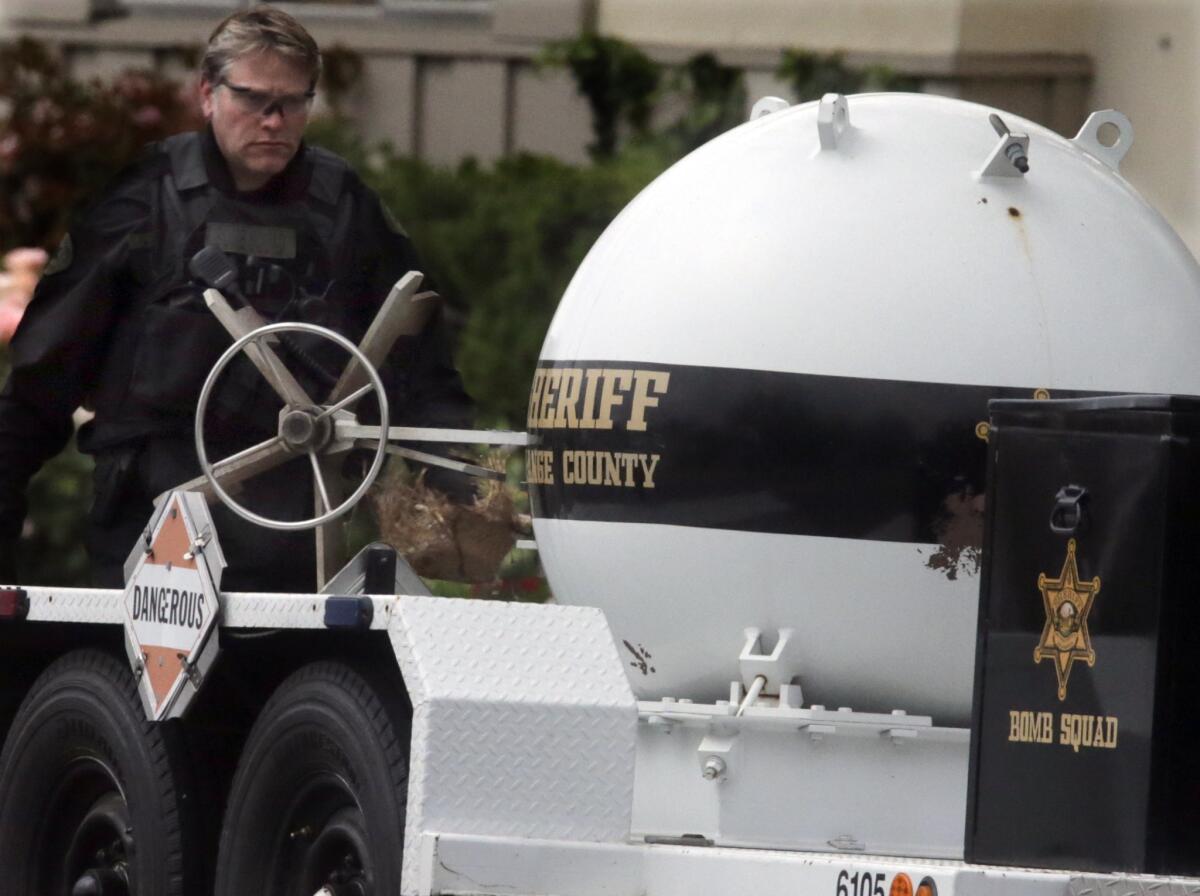Costa Mesa man who died in home blast was paranoid of the government

- Share via
The contents of a long, rambling essay written by a Costa Mesa man who likely blew himself up in an apparent suicide are concerning police, authorities said Monday.
The 17,000-word essay, titled “The Pricker: A True Story of Assassination, Terrorism and High Treason,” includes references to aliens, the O.J. Simpson trial, the U.S. government and “the pricker,” which the author describes as “an assassin’s weapon that deposits biological agents into a victim’s skin, on contact, without their knowledge.”
Though its author, 52-year-old Kevin Harris, apparently killed himself Sunday evening, elements of it are still of concern, said Lt. Jerry Hildeman. He declined to elaborate on what contents police were focusing on.
Throughout the paper, Harris expresses a belief that the U.S. government and its allies are all-powerful. Government leaders control the flow of information to the public and assassinate dissenters through freak accidents and diseases like cancer, he wrote.
He wrote that the government was behind the killing of Nicole Brown Simpson and John Lennon, the 9/11 terrorist attacks and the death of Righteous Brothers’ singer Bobby Hatfield.
Neighbors described Kevin Harris, 52, as odd but harmless with a history of mental illness, possibly schizophrenia. Harris appeared to address some of those issues in the essay.
“Even the lay public knows that hearing voices in your head is a symptom of schizophrenia,” he wrote. “It is so well publicized because it is a lie. The voices may tell the victim that there is a microchip in their brain, or other nonsense, but the voices are real.”
Neighbors told The Times they walked past Harris’ home at a brisk pace. The home was wrapped in tin foil, and cryptic notes would randomly appear, taped to a tree in the frontyard.
Doug and Jenny Nadasdy, who live near the scene, have resided there 28 and 20 years, respectively. The pair saw Harris minutes before he died, they said. Doug Nadasdy nodded at Harris and he nodded back, but that was the extent of their exchange.
The Nadasdys said they never saw lights on in the house. The explosion that authorities believe killed Harris sounded like a car crash or like a trash can falling, the Nadasdys said.
Costa Mesa Lt. Bryan Glass said officers responded to a loud bang at 7:45 p.m. Sunday and upon approaching saw Harris’ body in the front door. He was dead when they got there.
The inside of the house was dark because windows were covered with aluminum foil, Glass said.
Neighbors said Harris used to ride his bike around the neighborhood and had posted “The Pricker” to his tree out front.
David Rosendahl said he runs in the area regularly and first started noticing odd notes posted to a tree in front of the house about four or five months ago. He described the messages as “odd.”
“I guess that’s the only way to put it,” he said.
Rosendahl noticed a new note on Saturday morning and snapped a photo.
The note said: “For your information: My introspection and my adversaries behavior have convinced me that electronic mind reading is now reality.”
“It would be there for maybe a week or so and then disappear,” Rosendahl said. “Then another would pop up.”
Rosendahl said he’s also seen a clipboard and pen attached to the tree with papers allowing room for names, addresses and signatures – similar to voting logs, he said. Although a couple of the pages were blank, some information had been listed.
Harris’ essay warned of the dangers that lurk inside the home.
“I am at 3152 Bermuda Dr., Costa Mesa, CA, USA. You can tell it’s me because I am the only one who can get into my house,” the document reads. “I think it may be dangerous for you to come to my house alone.”
The document appears to have been first written in 2002 and updated in 2005. The website labels it a “draft of a work in progress.”
“Neither my mother, nor anyone else, has been in my house in years,” he wrote. “This is an application of call forwarding – away from my house, or some other telephones where it is known I will call. ‘Harmless’ calls are routed back to me.”
Neighbors said Harris would sit in a chair in his yard and never let anyone inside his home. There were cameras outside his house, neighbors said, but they never knew if they were working.
“I have been looking for people…who are not fakes, have not been fooled, tempted, intimidated, killed, crippled, or jailed, and who can not be ignored,” Harris wrote. “Because I have not found such a person, I have had no choice; I have had to become such a person.”
About 5:45 p.m. Sunday Costa Mesa police were called to Harris’ home for a report of a man down. When they got there, Harris got up and went back inside. He told police he was fine and was wearing a hat that said in effect, “I don’t need any help,” said Sgt. Jerry Hildeman.
Two hours later police were back and Harris was dead after an explosion. Three explosive devices were found inside the home. Two of them were crudely made, authorities said. They were detonated.
ALSO:
L.A. County government proposes budget with no cuts or deficit
John Galardi dies at 75; founder of Wienerschnitzel hot dog chain
Boston Marathon blasts prompts LAPD to beef up security at sport events
More to Read
Sign up for Essential California
The most important California stories and recommendations in your inbox every morning.
You may occasionally receive promotional content from the Los Angeles Times.











